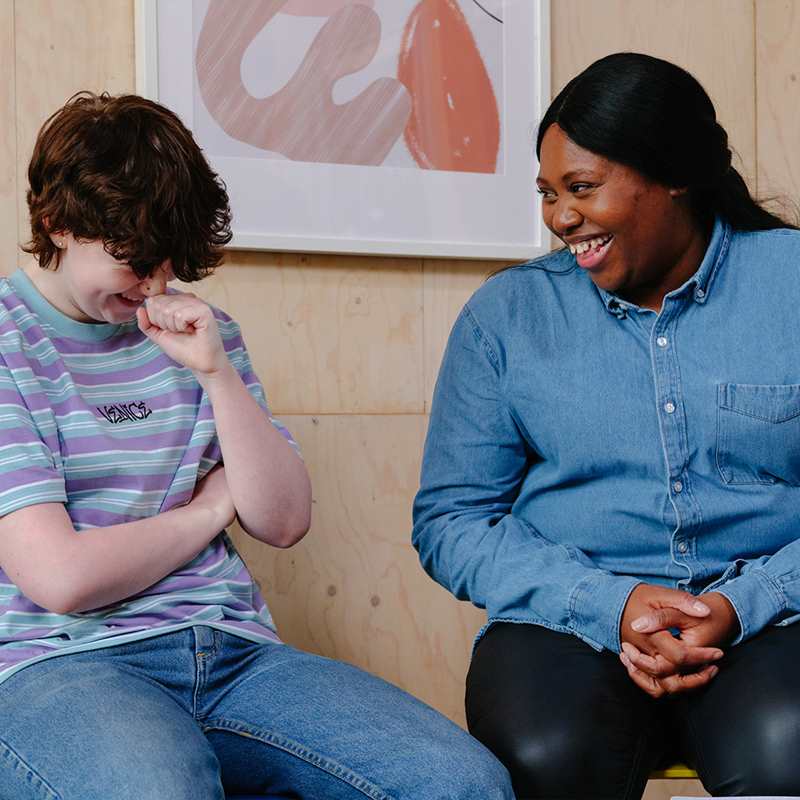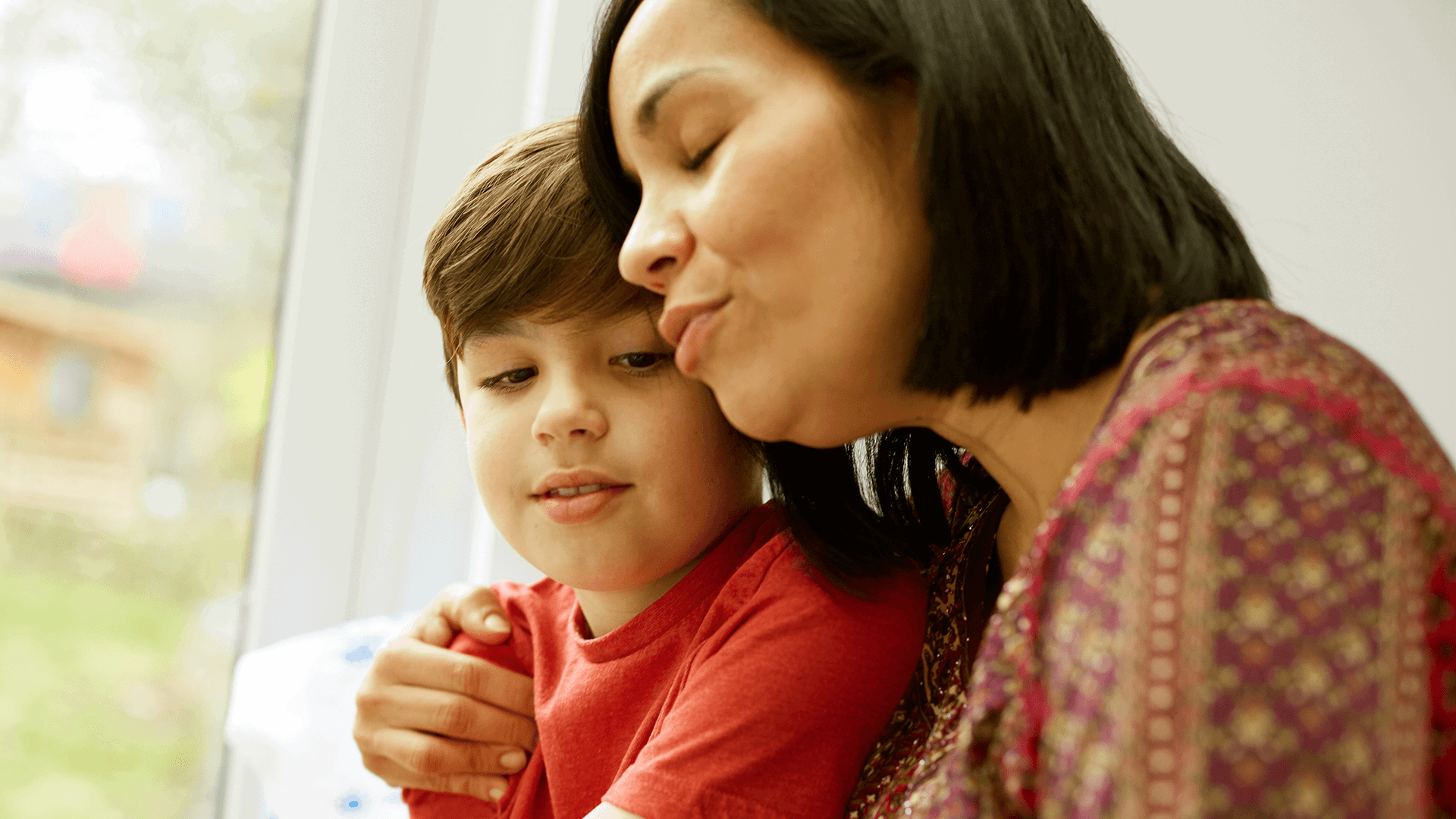How can parental mental illness affect young people?
Growing up with a parent who has a mental health condition can affect children and young people in different ways. Sometimes they might feel:
- confused about what's happening
- worried that their parent's mental health problem is their fault
- like they're responsible for taking care of their parent or their siblings, or for managing things like money
- like their parent's behaviour is worrying, upsetting, scary or unpredictable
- scared or worried about their parent self-harming or taking their own life
- sad about being separated from their parent if they need to spend time in hospital
They may also be more likely to miss out on school, hobbies or social activities if there are times when they feel like they need to make sure their parent or family is okay.
As their parent, you might sometimes feel worried about the impact the situation is having on your child. But remember, children and young people can cope in this situation when their parent is given good help. And when they get support for themselves from family, other adults and professionals when needed.

How can I help my child?
-
Give them opportunities to talk
Encourage your child to talk about how they feel, what their worries are and how the mental illness in the family is affecting them. You can find our tips on starting a conversation with your child here.
-
Ask what they find difficult
Ask your child if there is anything about the situation they find particularly difficult, upsetting or scary. Think together about whether there are any changes that could be made to make things easier.
-
Find someone else for them to talk to if needed
If your child finds it difficult to talk to you, encourage them to open up to another adult who they trust. This could be another family member, a family friend, their teacher, a counsellor or their GP.
-
Explain what's happening
Give your child clear information about what their parent is experiencing. This can help them to understand what is going on and help them to know that it is not their fault.
-
Keep normal routines going
This could be things like going to school, seeing friends, having space away from the family and getting time to do activities or hobbies they enjoy.
-
Find out what support is available
Ask the professionals who are supporting you or their co-parent about services that can help the rest of the family. Sometimes, this might involve help from social services. Their role is to assess the situation and offer help and support. Parents sometimes worry about their child being taken away in this situation. But this would only happen if there was no other way to keep them safe.
Where can I find support for my child?
Children of a parent with mental illness can often take on a carer role in the family. This can include doing jobs around the house, cooking meals, looking after their parent's needs and giving them emotional support, making sure their parent takes their medication and looking after younger siblings.
Young people in this situation need help to make sense of what's happening and support to look after themselves. If this is the case for your child, there are lots of local organisations that can support them. You should be able to find young carers services near you by searching online. You can also take a look at our young person's guide to being a young carer.
Contact your child’s school teacher or college tutor to let them know what's going on and to see what support they can offer.
Alongside counselling, schools can often provide support from the pastoral team, a member of staff who your child can chat to when they need to, mentoring, peer buddying and clubs and activities.
Depending on their age, it may be important to make sure your child feels some control over the information that’s shared about them – for example by discussing with them who they would feel comfortable for you to speak to.
Counsellors and therapists can provide emotional support and help your child to make sense of, and find ways to cope with, what's going on in their life. Therapists working with younger children will usually work through play and arts activities such as painting, drawing and making things.
Read our guide to find out how you can access counselling or therapy for your child.
If you're worried that your child is struggling with their mental health as a result of the situation, speaking to your GP is usually the first step to accessing support. Your GP can provide information and advice, signpost you to local services and discuss treatment and support options with you. Depending on your child's situation, they may refer them to the NHS mental health service for young people, known as CAMHS.
You can find more advice on getting support from GPs in our guide for parents and carers.
Useful websites and services
While we take care to ensure that the organisations we signpost to provide high quality information and advice, we cannot take responsibility for any specific pieces of advice they may offer. We encourage parents and carers to always explore the website of a linked service or organisation to understand who they are and what support they offer before engaging with them.
-
YoungMinds Parents Helpline
We support parents and carers who are concerned about their child or young person's mental health. Our Parents Helpline provides detailed advice and information, emotional support and signposting.
You can speak to us over the phone or chat to us online.
You can speak to us over webchat between 9.30am and 4pm from Monday-Friday. When we’re closed, you can still leave us a message in the chat. We’ll reply to you by email in 3-5 working days.
- Opening times:
- 9.30am-4pm, Monday-Friday
-
Mind
Offers advocacy services, as well as information and signposting on mental health difficulties, via the Mind Infoline.
Also hosts Side by Side, an online community for those aged 18 and over to connect with others who are going through, or have been through, similar experiences.
- Opening times:
- 9am - 6pm, Monday to Friday (except for bank holidays)
-
Mind Legal Line
Provides information and advice on mental health law, including being detained, mental capacity, community care and discrimination and equality.
- Opening times:
- 9am - 6pm, Monday to Friday (except for bank holidays)
-
Rethink Mental Illness
Information and practical help on mental illness, medication, care and law. They have a helpline and webchat service.
You can also find support groups near you using their group finder.
- Opening times:
- Advice line: Monday - Friday, 1pm-4pm; Webchat: Monday-Friday, 9:30am – 4pm
-
SANE
Provides care and emotional support for people aged 16 and over affected by mental illness, including families and carers.
SANEline services include a telephone helpline open every day of the year as well as a text service and email support service. You can also leave a message on 07984 967 708 and you will be called back within a few days.
- Opening times:
- 4pm -10pm, daily
-
Bipolar UK
Provides information and a peer support service for people affected by bipolar, including friends and family. Find a local support group.
-
Scottish Association for Mental Health
Provides local support services to people affected by mental illness in Scotland.
- Opening times:
- 9am - 5pm, Monday to Friday
-
PANDAS
Emotional support for any parent experiencing pre or post natal depression, or another mental health issue such as anxiety, during or after a pregnancy or birth.
As well as using their helpline, you may be able to find a local support group.
- Opening times:
- Every day, 11am - 10pm
-
Carers UK
Provides information, advice and support for carers. Find services in your local area.
-
Survivors of Bereavement by Suicide (SOBS)
Offers support for people over the age of 18 who have lost someone to suicide.
- Opening times:
- 9am - 9pm, Monday - Friday
-
Nacoa
Provides information, advice and support for anyone affected by a parent’s drinking.
Whether you love the page or think something is missing, we appreciate your feedback. It all helps us to support more young people with their mental health.
Please be aware that this form isn’t a mental health support service. If your child is in crisis right now and you want to talk to someone urgently, find out who to contact on our urgent help page.
At YoungMinds we take your privacy seriously. If you’d like to read more about how we keep the information we collect safe, take a look at our privacy policy.
